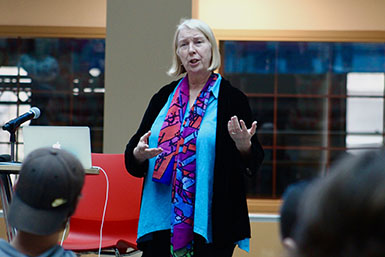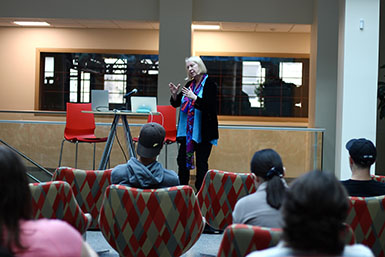Acclaimed cinematographer Raschke reflects on her career

Documentary film cinematographer Claudia Raschke spoke with Media School students Thursday about her journey as an artist, which ultimately led to her discovering her passion for cinematography. Raschke shared clips from a variety of the films she’s worked on including “RBG,” “Fauci,” and “God is the Bigger Elvis.” Raschke also highlighted her earliest documentary cinematography work, such as “Mad Hot Ballroom” which premiered at the Slamdance Film Festival in 2005.
Prior to her interest in film, Raschke pursued various fields in the fine arts including painting, sculpting, music, and dance. She eventually found her calling in the film industry and worked on feature films for 10 years. Raschke transitioned into documentary filmmaking because of her fascination with exploring real-life stories and bringing them into the spotlight.
“When you capture real-life stories, you are exposed in a different way,” said Raschke. “You are stepping into someone else’s reality.”
Raschke credited her modern dance background as a useful asset during the filming of “Mad Hot Ballroom,” which documented the lives of New York City public school students participating in a ballroom dance program as they prepare for a citywide competition.
After the premiere of the film, Raschke was approached to work on “God is the Bigger Elvis,” which follows former Hollywood starlet, now Benedictine nun Dolores Hart. The 2012 film was nominated Best Documentary (Short Subject) at the 84th Academy Awards. When reminiscing on working on this film, Raschke noted how many of the nuns featured in the film, along with Dolores Hart, had careers, spouses, and children before joining the convent. Raschke expressed how this experience gave her a new perspective on her own life.

“You are so bombarded by distractions in life you cannot understand yourself,” said Raschke.
Shortly after, Raschke began to work on “Particle Fever,” which followed a group of international scientists trying to understand the origins of matter and why it sticks together. Raschke was initially worried it would not receive a theatrical release because physics draws in more of a niche audience. However, the film received critical acclaim and was released in theaters after premiering at several film festivals.
Raschke then went on to work on several documentary films including “The Freedom to Marry,” which followed the civil rights campaign of the same name that fought for the legalization of same-sex marriage in the U.S. Raschke has a passion for human and equal rights which is reflected in her work.
Raschke was then contacted by the directors of “RBG” who strived to have an all-female crew on the film. The film chronicled the life and career of Supreme Court justice Ruth Bader Ginsburg and was one of the most successful and popular films Raschke had ever worked on. The 2018 film featured interviews from Bader Ginsburg herself as well as archival footage. While her time with Bader Ginsburg was limited, Raschke reflected on her experience with the inspirational Supreme Court justice as one of the most memorable of her career.
While Raschke is most well known for her work in film, she also has experience in documentary mini-series made for television. “Activate” was a six-part documentary series highlighting extreme global poverty. Similarly, to “God is the Bigger Elvis,” working on “Activate” gave Raschke a new perspective on her life. Raschke was able to connect with many different communities and cultures during the filming of “Activate,” and she cited this project as one of the biggest turning points of her life.
Raschke’s cinematography career continues to evolve with her most notable recent projects ranging from “Julia” which documented the life of famous cookbook author and television personality Julia Child to “Fauci” which covered the career of Dr. Anthony Fauci former chief medical advisor to former President Donald Trump and President Joe Biden. Given the prominent role Dr. Fauci served during the COVID-19 pandemic and notoriety in the media, the 2021 release was topical and relevant.
Raschke’s visit to IU was part of an education initiative created by Canon. The brand is fortunate to collaborate with some of the hardest working and well-known creators in both still and motion and feels strongly about having these creatives share their experiences with students across the country. Students represent the next generation of content creators and Canon wants to provide interactive educational activities to augment what the universities are currently doing.

